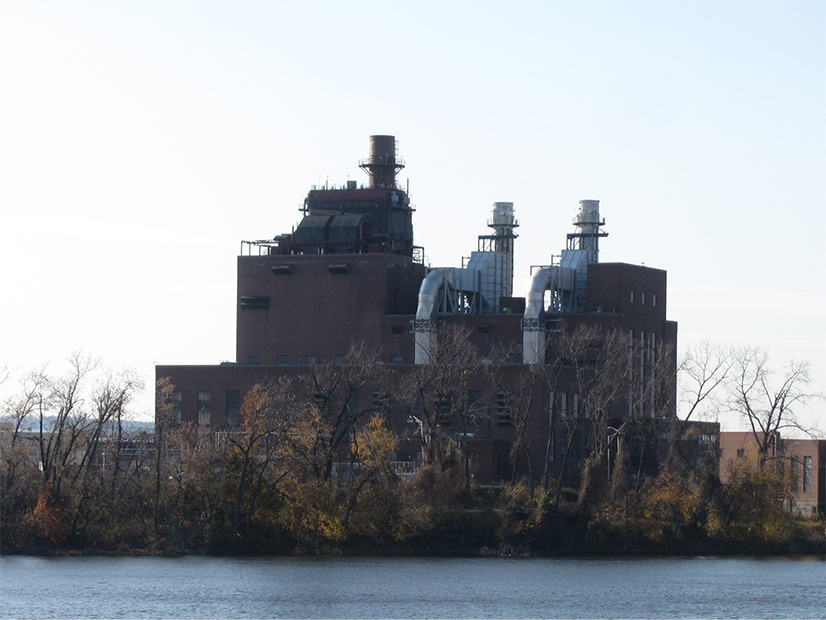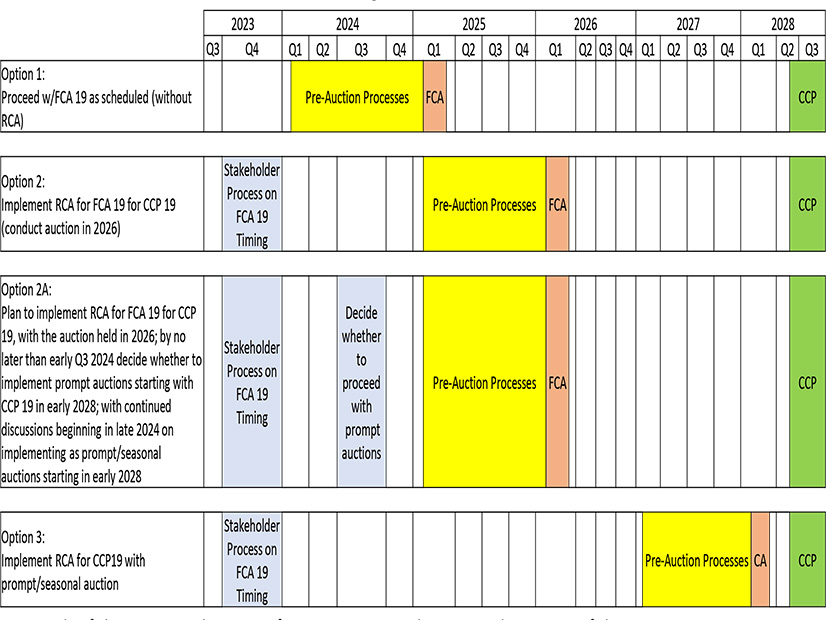
STOWE, Vt. — ISO-NE on Tuesday solicited feedback from the NEPOOL Markets Committee on several options for the timing and overall design of Forward Capacity Auction 19.
FCA 19 will procure capacity for the 2028/29 capacity commitment period. While the RTO had hoped to implement resource capacity accreditation (RCA) changes in FCA 19 aimed at improving estimations of gas generator winter reliability limitations, a software error related to LNG availability has delayed the process. (See ISO-NE Outlines More of Plans for Capacity Accreditation, DA Ancillary Services.)
NEPOOL is also considering a move to a prompt seasonal capacity market and whether this move should be initiated for FCA 19, at a later date or not at all. (See Discussion Continues on ISO-NE Capacity Market Changes.)
ISO-NE has laid out a series of options for stakeholders to consider for FCA 19, asking for input on preferred routes:
1. conduct FCA 19 using the current market rules without implementing RCA.
2. push the auction date back a year, from 2025 to 2026, and include RCA changes.
2a. plan to implement RCA in FCA 19 with the auction held in 2026, but decide by Q3 2024 whether to instead move to a prompt and seasonal auction held in 2028.
3. transition to a prompt and seasonal auction for FCA 19, with the auction held in early 2028, providing time to implement RCA.
“In each of the options, the start of CCP 19 remains the same. The timing of the pre-auction processes and auction varies,” Tongxin Zheng of ISO-NE told the committee.
ISO-NE has not endorsed any of the options and has said that all of them remain on the table.
Several committee members expressed support for delaying the auction a year to help consider and potentially implement significant changes.
Massachusetts Assistant Attorney General Ashley Gagnon wrote in a memo prior to the meeting that a one-year delay of FCA 19 “to determine the appropriate path forward for FCA 19/CCP 19 is worth serious ISO and stakeholder consideration and discussion given the importance of the decision and the current lack of information essential to making an informed decision.”
Gagnon said that delaying the auction would allow ISO-NE to finish the RCA design process and more thoroughly contemplate the possibility of moving to a prompt and/or seasonal market. Gagnon also stressed the importance of keeping ratepayers in mind while contemplating the options.
“The AGO [Attorney General’s Office] recommends that potential costs to consumers be an explicit consideration and evaluation metric in deciding the optimal path forward for CCP 19 and beyond. While the AGO recognizes that potential costs to consumers may be difficult to analyze at this stage, consumer impacts are critical and should inform the decision-making process,” Gagnon said.
Brett Kruse of Calpine also expressed his support of option 2a, noting that the company has been advocating for a move to a prompt capacity market for several years.
“We’re fine with a one-year delay for FCA 19 in order to allow ISO-NE to implement RCA (option 2) but marginally prefer 2a because of the addition of the prompt procurement aspect,” Kruse told RTO Insider. “We’re interested in option 3 that would also add a seasonal market design, but need to be comfortable with some details about the design, which is fairly conceptual at this point.”
Eric Wilkinson of Ørsted said that the capacity market changes must properly account for the reliability attributes of renewables.
“Ørsted supports ISO-NE’s efforts to revise their capacity market rules,” Wilkinson said. “As the fuel mix for electric generation continues to evolve, it is important that the capacity market appropriately values the contributions to system reliability that renewable resources, including offshore wind, provide.”
ISO-NE plans on choosing an option by late September and bringing forward a proposal in October.
Seasonal Auction Timing
ISO-NE also presented some pros and cons of holding seasonal auctions within a given CCP simultaneously or serially.
“Either approach could be used with a forward or prompt procurement of capacity,” said Chris Geissler of ISO-NE. “However, pros/cons associated with each depend on whether procurement is forward or prompt.”
Geissler said that the benefits of serial seasonal auctions could be more pronounced under a prompt construct, which would allow the auction to reflect the most up-to-date information.
Meanwhile, Geissler noted that holding the auction simultaneously would enable capacity sellers to specify different offer prices for each season and the entire CCP, as well as helping to ensure revenue sufficiency for sellers.




